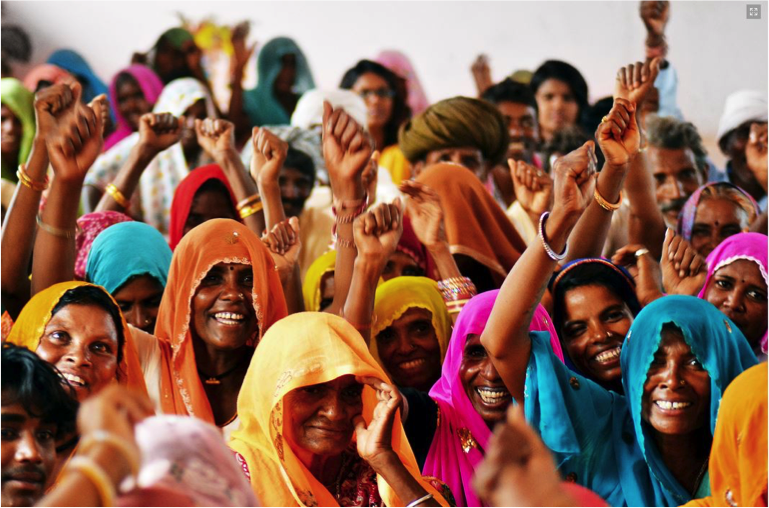
Where is the problem?
India has many heroines, yet some seem to be more prominent than others. A quick list of famous Indian women who blazed the trail would include Rani Lakshmibai, Vijaya Lakshmi Pandit and many others. Some of these lists may include Savitribai Phule, a Dalit woman considered to be India’s first female teacher. However, many others such as Jhalkaribai and Nangeli are simply brushed aside. Dalit women have often agitated for change, questioning both caste and gender roles present in Indian society. For Dalit women, opportunity and vulnerability go hand in hand, they have never been passive victims.
Nangeli: A Personal and Bloody Protest
In Travancore a breast tax was levied on lower-caste and untouchable women if they wanted to cover their breasts until 1924. Tax collectors would visit every house to collect from any lower-caste woman who had passed the age of puberty, with the tax being dependent on the size of the breasts. The tax was the subject of the violent and brutal Channar revolt of 1859. The community hung two lower-caste Nadar women who had covered their breasts while out in public. People officially recognize The Channar revolt, its authenticity is not debatable.
The legend of Nangeli is much more nebulous. There is no written evidence that this event occurred, or that she existed, however, her legend is one that has remained. Nangeli refused to leave her breasts uncovered, something that many saw as being disrespectful to the higher caste. Her family was too poor to afford the tax that would have given her the right to cover. She argued that they belonged to her and therefore could not be taxed by the kingdom. Hearing of her defiance, the tax collector arrived at her house to collect the money. Nangeli initially argued, until overcome by rage she picked up her sickle knife, cut off her breasts and presented them to him on banana leaves. The tax collector fled, leaving Nangeli to bleed to death on her doorstep.
Her death set off a series of movements and agitations. It ultimately resulted in the annulment of the tax in Travancore. The place where she lived came to be known as Mulachiparambu, the land of the breasted woman. Yet as she remains an iconic folk-hero for Dalits, there is no mention of Nangeli in Kerala’s official records. Nangeli’s legend remains inspirational because she has remained one of the more well-known Dalit heroines who fought back against unjust, Brahminical, patriarchal structures. Nevertheless, not many outside the South Indian Dalit community know about her.
Jhalkaribai: The Forgotten Warrior
We see this repeated in the story of Jhalkaribai, oft touted as the greatest Indian female warrior many don’t know about. As Rani Lakshmibai came to the forefront of politics in the 1850s, many did not realise that one of her prominent advisors was a Dalit woman. Since a young age, Jhalkaribai was trained to use weapons, ride horses, and fight; and she bore an uncanny resemblance to the Rani of Jhansi. As word of her resemblance to Lakshmibai, along with tales of her bravery and courageous nature reached the Rani, Lakshmibai entrusted her with leading the women’s wing of the army.
As the 1857 revolt started, and Jhansi began to participate, Jhalkaribai rose to prominence as a gifted leader and able warrior. However, in March 1858, the British quickly overran Jhansi, and Rani Lakshmibai had to make her famous escape into the night with her son, jumping over the fort walls on the back of a horse. Jhalkaribai fought fiercely as the Rani escaped, and using her resemblance, she began to deceive the British into thinking that they had finally cornered the infamous Rani. They shot her when they discovered her identity. Martyred for a cause that forgot her story for a century. Yet she lived in the stories and songs of the Dalit communities of Jharkhand and Bundelkhand.
The stories and poems of Jhalkaribai challenge the authoritative history of Rani Lakshmibai. Here we had the martyrdom of not just a queen, with everything to lose—her kingdom, palace, jewels, and position, but also a Dalit woman with nothing to lose. Jhalkaribai was not a queen nor a daughter of some feudal lord. She fought selflessly and fearlessly despite having no stake in politics. Her sacrifice may be termed as even more magnificent than Rani Lakshmibai’s.
History Remembered
The savarna have a terrible custom of intentionally writing Dalit contributions, especially Dalit women’s contributions to our society and history. As Dalit writer Ramdayal Verma once famously said: “Here, there and everywhere, you will find discussion on their deeds, but the Dalit heroes are never written about in the papers”. We cannot forget Nangeli, as her act was not just a sacrifice; it was a call for change, it was a rebellion. We cannot forget Jhalkaribai, as her act of defiance in the face of certain death saved the life of one of our most famous national heroines. Without Jhalkaribai, there is no Lakshmibai. Without the struggle of Dalit women, there is no India.

About The Author
Swagata is currently studying law and global politics and is a keen student of history. She has been an active campaigner for awareness about sexual assault keeping institutions accountable.
Some other blog posts you might like:
Image Source: